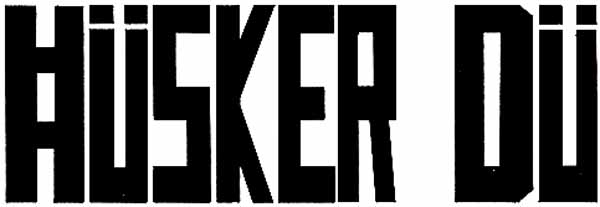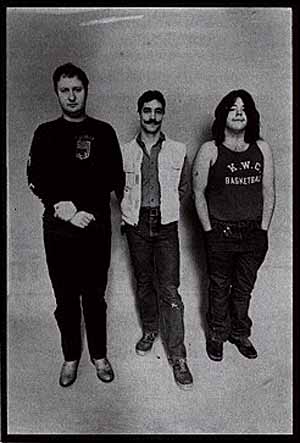B.O.B.: I recognized your new B-side as the Mary
Tyler Moore show signature tune. Are you TV
fans and watchers of American culture general-
ly?
B.M.: It's a mirror. It's just nice to see what the
status quo thinks is outrageous, because
that's what you'll see on TV, not what out-
rageous peple think is outrageous. It tells
you a lot about what the national thought is,
because it is such a big country the only real
hook up is TV. Sort of pervasive on each
coast.
B.O.B.: Are ther literary influences on your world-
view and song content.
B.M.: For a fictional writer, someone like Eugene
Burdick who wrote 'The Ninth Wave', 'Failsafe'
and 'The 480' where it's an exposure of how
the media and events can shape faceless
objects into icons. Then, Fran Leibowitz,
which is completely dry city humour just
realising the absurdities of living in
Megalopolis. A lot of post-war Japanese
writing, Mishima and stuff, where it's "you
think you're bombed, try this on for size,
this'll make you feel good". I ike finding
humour in the absurd.
G.H.: I was never a real fan of fiction once I grew
out of children's literature. I don't find too
much time to read anymore but I read all of
Steinbeck's books and a lot of non-fiction,
like World War Two stuff which intrigues me
'cause it seems like such a great big event.
B.O.B.: To a lot of people who fought in it it was
certainly the major feature in their lives.
But a lot of that is people seeking exper-
iences that never satisfy them because they
never make contact with truth, which isn't an
'experience'.
G.H.: Well, y'know, a lot of people go back up in the
attic when they're forty years old and put on
their high school football sweater and it's
like, God, the Allies were the biggest team
ever assembled for a championship sport.
B.M.: I don't think that sort of reliving the past
is unhealthy for some people. I think in
perspective it's alright.
|
G.H.: You have to think about your past happiness to
put your present happiness in operspective.
B.O.B.: I wouldn't agree with that myself but.....
How much work and pre-production goes into
your songs?
B.M.: It depends on the individual song. Some of the
ones you think are classics that take weeks to
work up are not that well-liked and some that
you write in five minutes are the best.
G.H.: The best songs write themselves. They just use
the author as someone to hold the pen, just a
vehicle.....
B.O.B.: Are you alluding to a mystical process?
G.H.: No; just that the best songs I've written have
poured out of me....
B.M.: But that's not music using you, that's you
using music as a vehicle. If you're saying
that it came out of nowhere and mystically
forced your body to do it, I mean, yeah, it's
to that extent but it's a learned experience,
it's not an unconscious thing.
G.H.: It didn't happen before I played, yeah....
B.M.: Everyone has the greatest song in the world
in their heads, it's a matter of using your
tools.
B.O.B.: How do you feel about 'New Day Rising' now?
B.M.: I think the songs still stand up real well in
retrospect. The production leaves a lot to be
desired; it's just a matter of working with
too many people with too many ideas on how it
should sound, ours should have over-ridden
everybody else's. Just a classic case of too
many cooks in the same kitchen. Whereas 'Flip
Your Wig', the new one, we did all ourselves
and it's head and shoulders above 'New Day',
as every record should be above the previous
one. I tend to like 'Zen Arcade' a little more
in retrospect than I do 'New Day'. 'New Day'
was a step backward, but it was a good place
to take it; 'Zen Arcade' was a little heavy
for what we were up to. The new one goes back
to the idea of the live thing, a straight
ahead rock 'n' roll album; every record should
not be like 'Zen Arcde', it would get
ridiculous, a bit.
INTERVIEW BY: CRAIG ANTLER.
|

